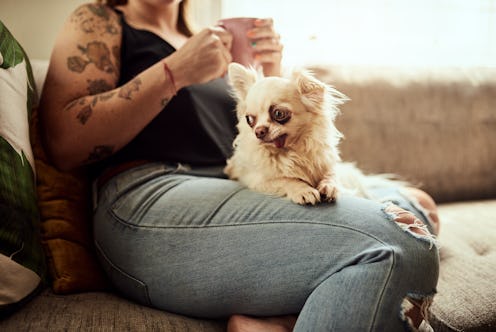Life
Here’s How Doing Dry January Can Affect Anxiety

After the mulled wine and eggnog-lashed parties of December, you might have opted to go sober for a while to reset your system (or save some money, or any of the other myriad reasons people go dry in January). Dry January can be a good way to reexamine your drinking habits for the year ahead, or just to try something different for a while. But if you're planning on a month-long period of sobriety, an expert tells Bustle it's worth noting that going sober can affect symptoms of anxiety, particularly if you've been using alcohol to help you cope with anxious moments over the holiday season.
Going sober in January can have effects on many aspects of your life, including your mental health. "A reduction in drinking is a worthy goal as it not only improves your sleep but can improve your overall health and well-being," Dr. Joseph Volpicelli, M.D., a psychiatrist and sobriety expert, tells Bustle.
The relationship between alcohol and anxiety is a two-way street: One can directly affect the other and vice versa. People with anxiety are more likely to drink higher quantities of alcohol, according to 2017 research published in Alcoholism: Clinical & Experimental Research. Alcohol can be a coping mechanism for people with anxiety, particularly those who experience anxious feelings around social events; the Anxiety & Depression Association of America (ADAA) notes that there's a distinct link between social anxiety disorder and a tendency to drink. Alcohol can temporarily calm anxiety symptoms by making you feel more carefree and releasing endorphins and dopamine, which can raise your mood. This means that going without alcohol for a while may increase anxiety symptoms for a brief period.
Sobriety can affect anxiety in other ways, though, and not all of them mean an increase in symptoms. For one, going sober can reduce the risk of a post-drinking spike in anxiety known as "hangxiety." A study published in 2019 in Personality & Individual Differences found that shy people are much more likely than others to experience a rush of anxiety after a night of drinking, as they worry about their behavior from the night before. Not drinking for the month will mean you can't use a glass of wine as a security blanket in social situations, but it can also reduce the anxiety of the morning after.
Another aspect of sobriety that can affect symptoms of anxiety, according to experts, is sleep. Sleep quality decreases when you drink, though you might think it helps you drop off. "Even a little bit of alcohol can have an impact on your sleep quality," Volpicelli tells Bustle. "Alcohol can sedate people, so they fall asleep faster, but research shows that alcohol lowers restorative sleep quality and interferes with your REM cycle." The result is a less refreshed brain, lower attention, and a host of other cognitive issues that last beyond the day after a night out. And this can have big consequences for anxiety.
The less restful your sleep, the more anxious you feel. The ADAA notes that lower sleep quality is strongly tied to increased anxiety symptoms. A 2018 study published in Frontiers of Psychiatry suggests it might be something to do with the amygdala, the brain's center for fear processing, which might increase anxiety when it's not properly rested.
The good news is that not drinking can increase sleep quality, and reduce anxiety symptoms as a result. "People participating in Dry January may notice that their quality of sleep improves after a few days," Volpicelli tells Bustle. As your brain revels in its new, less disjointed sleep, your anxiety symptoms may begin to decrease.
If you're participating in Dry January and have experienced anxiety in the past, you may experience changes in anxiety symptoms over the course of the month — from an initial spike as you first stop using alcohol to a gradual decrease as your sleep improves. If you have an anxiety disorder, it's a good idea to monitor your month of sobriety with a therapist or your doctor. That way, you can make sure that you're getting the appropriate support to get through any rough patches and end the month positively.
If you or someone you know is seeking help for substance use, call the SAMHSA National Helpline at 1-800-662-HELP(4357).
Studies cited:
Gorka, S. M., & Phan, K. L. (2017). Impact of anxiety symptoms and problematic alcohol use on error-related brain activity. International Journal of Psychophysiology : official journal of the International Organization of Psychophysiology, 118, 32–39. doi:10.1016/j.ijpsycho.2017.05.011
Klumpp, H., Hosseini, B., & Phan, K. L. (2018). Self-Reported Sleep Quality Modulates Amygdala Resting-State Functional Connectivity in Anxiety and Depression. Frontiers in Psychiatry, 9, 220. doi:10.3389/fpsyt.2018.00220
Markarian, S. A., Pickett, S. M., Deveson, D. F., & Kanona, B. B. (2013). A model of BIS/BAS sensitivity, emotion regulation difficulties, and depression, anxiety, and stress symptoms in relation to sleep quality. Psychiatry Research, 210(1), 281–286. doi: 10.1016/j.psychres.2013.06.004
Marsh, B., Carlyle, M., Carter, E., Hughes, P., Mcgahey, S., Lawn, W., … Morgan, C. J. (2019). Shyness, alcohol use disorders and ‘hangxiety’: A naturalistic study of social drinkers. Personality and Individual Differences, 139, 13–18. doi: 10.1016/j.paid.2018.10.034
Mccaul, M. E., Hutton, H. E., Stephens, M. A. C., Xu, X., & Wand, G. S. (2017). Anxiety, Anxiety Sensitivity, and Perceived Stress as Predictors of Recent Drinking, Alcohol Craving, and Social Stress Response in Heavy Drinkers. Alcoholism: Clinical and Experimental Research, 41(4), 836–845. doi: 10.1111/acer.13350
Okun, M. L., Mancuso, R. A., Hobel, C. J., Schetter, C. D., & Coussons-Read, M. (2018). Poor sleep quality increases symptoms of depression and anxiety in postpartum women. Journal of Behavioral Medicine, 41(5), 703–710. doi: 10.1007/s10865-018-9950-7
Expert:
Dr. Joseph Volpicelli M.D., psychiatrist and sobriety expert
This article was originally published on